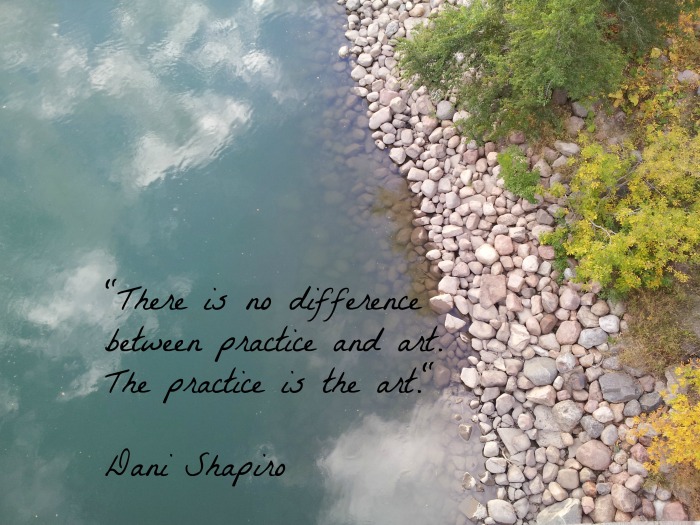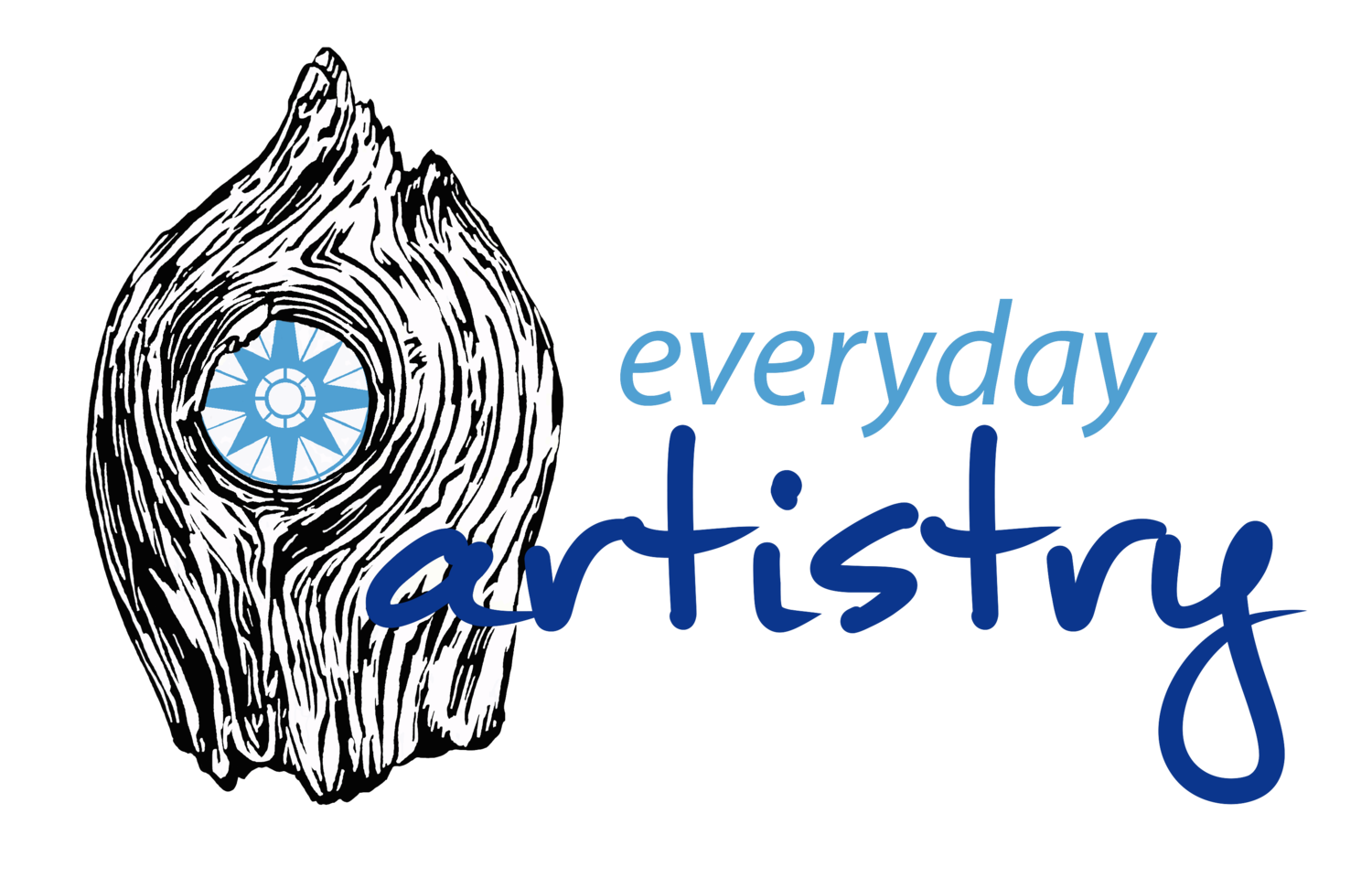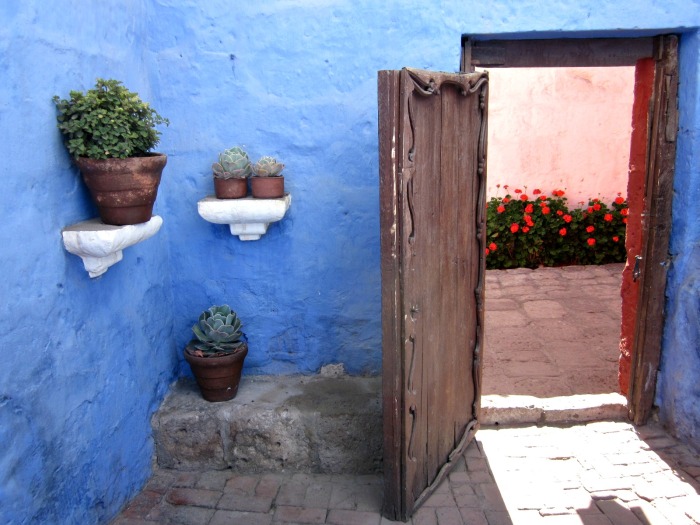
"If I waited to be in the mood to write, I’d barely have a chapbook of material to my name. Who would ever be in the mood to write? Do marathon runners get in the mood to run? Do teachers wake up with the urge to lecture? I don’t know, but I doubt it. My guess is that it’s the very act that is generative. The doing of the thing that makes possible the desire for it. A runner suits up, stretches, begins to run. An inventor trudges down to his workroom, closing the door behind him. A writer sits in her writing space, setting aside the time to be alone with her work. Is she inspired doing it? Very possibly not. But this is her habit, her job, her discipline. Think of a ballet dancer at the barre. She is practising, because she knows there is no difference between practice and art. The practice is the art."
Dani Shapiro, Still Writing
Last year a friend gave me a Tarot deck for my birthday and I tried a reading for the first time. It was a time of upheaval and uncertainty so I asked the cards what was the next step I should take in my business. Many of the cards made a lot of sense but one that confused me a bit was the Hierophant card. Here's an interpretation: "The Hierophant Tarot card suggests that you may be wise to follow established social structures and traditions. You may be involved in some sort of ritual, ceremony, or the trappings of religion. There is also a need to honour some tradition in your life, or maybe start some traditions of your own if you have none."
After thinking about it for a bit it became clear what kind of "rituals" and "traditions" the card was asking me to try. Creative rituals.
"It’s vital to establish some rituals -- automatic but decisive patterns of behavior -- at the beginning of the creative process, when you are most at peril of turning back, chickening out, giving up, or going the wrong way.
A ritual, the Oxford English Dictionary tells me, is a “prescribed order of performing religious or other devotional service.” All that applies to my morning ritual. Thinking of it as a ritual has a tranforming effect on the activity.
Turning something into a ritual eliminates the question, Why am I doing this? By the time I give the taxi driver directions, it’s too late to wonder why I’m going to the gym and not snoozing under the warm covers of my bed. The cab is moving. I’m committed. Like it or not, I’m going to the gym.
The ritual erases the question of whether or not I like it. It’s also a friendly reminder that I’m doing the right thing. (I’ve done it before. It was good. I’ll do it again.)"
Twyla Tharp, The Creative Habit
In 2014, one of my 3 resolutions was to establish new habits of creative productivity. You can read about the goal-setting process here and my system for staying accountable to these resolutions here. The quick version is that every week I come up with a new mission to help me get closer to my goals. Since I've also been reading everything I can get my hands on about creativity, I've been paying close attention to what other creative people have written about habits and incorporating these ideas bit by bit into my weekly missions.
"It doesn't matter what the deal is that you strike with yourself, as long as you keep up your end of it, that you establish a working routine for yourself, a rhythm. I prefer to think of it as rhythm rather than discipline. Discipline calls to my mind a taskmaster, perhaps wielding a whip. Discipline has a whiff of punishment to it, or at least the need to cross something off a list, the way my son Jacob does with his homework. Rhythm, however, is a gentle aligning, a comforting pattern in our day that we know sets us up ideally for our work."
Dani Shapiro
Some of the things I've tried to help establish rhythm in my own life include:
- Moving down from full time to part time work so I have two whole days to create
- Getting chores done on Sundays or evenings during the week to protect my creative days and keep them open
- Doing creative work first thing in the morning - writing when I'm at the office (I have a lot of free time at my job) and developing new projects at home. I always start with the hardest thing, the thing that I would rather avoid doing.
- Writing down a numbered list of projects for each day. Instead of scheduling blocks of time, I just number my to-do items in order of priority. This helps me fluidly move from one thing to the next at a comfortable pace. When it's time for the next thing on the list, I jump in and do it, whether I feel like it or not.
- Keeping track of time spent on all creative work and trying to increase the count each week
- Creating and keeping up with online creative challenges every other month (there's one coming up in October!)
- Working on projects just for me - not to sell - to experiment and develop my skills
"There’s a paradox in the notion that creativity should be a habit. We think of creativity as a way of keeping everything fresh and new, while habit implies routine and repetition. That paradox intrigues me because it occupies the place where creativity and skill rub up against each other."
Twyla Tharp
If these things sound really organized, methodical, clinical - the opposite of creative - that's because they are. My goal is to make space for creativity by creating routines. If I don't have to wonder about what to do next, if I have fewer decisions to make then I have more juice, more creative energy left. I want to make creative production as seamless and easy as possible so that, rather than fighting with myself to sit down at the computer or the craft table, I end up there without even realizing how I did it. I'm not there yet - certain days are easier to program and my plans frequently go off the rails. But I have noticed my production increasing, my ideas increasing, my level of satisfaction increasing - which is why we do this after all, isn't it?
“I keep to this routine without variation. The repetition itself becomes the important thing; it’s a form of mesmerism. I mesmerize myself to reach a deeper state of mind.”
Haruki Marakami
Will you join me in making creativity a part of your daily life? How can you set up routines, rituals, rhythms, habits to help you get there? Leave a comment below!









 I was bitten by the travel bug at a young age. My mom has told me numerous times about how strange it felt to put her 5-year old daughter on a bus to go to a weekend Brownie Camp. I was small and shy but there was no way I wasn't going on that trip. Since then I've spent summers living in Quebec, New York, and Edinburgh, driven from one end of the United States to the other and back again, and spent 10 months backpacking and learning to weave in Peru, Argentina, and Bolivia. These trips and others have provided more creative fuel than probably anything else I've done.
I got the idea for my
I was bitten by the travel bug at a young age. My mom has told me numerous times about how strange it felt to put her 5-year old daughter on a bus to go to a weekend Brownie Camp. I was small and shy but there was no way I wasn't going on that trip. Since then I've spent summers living in Quebec, New York, and Edinburgh, driven from one end of the United States to the other and back again, and spent 10 months backpacking and learning to weave in Peru, Argentina, and Bolivia. These trips and others have provided more creative fuel than probably anything else I've done.
I got the idea for my